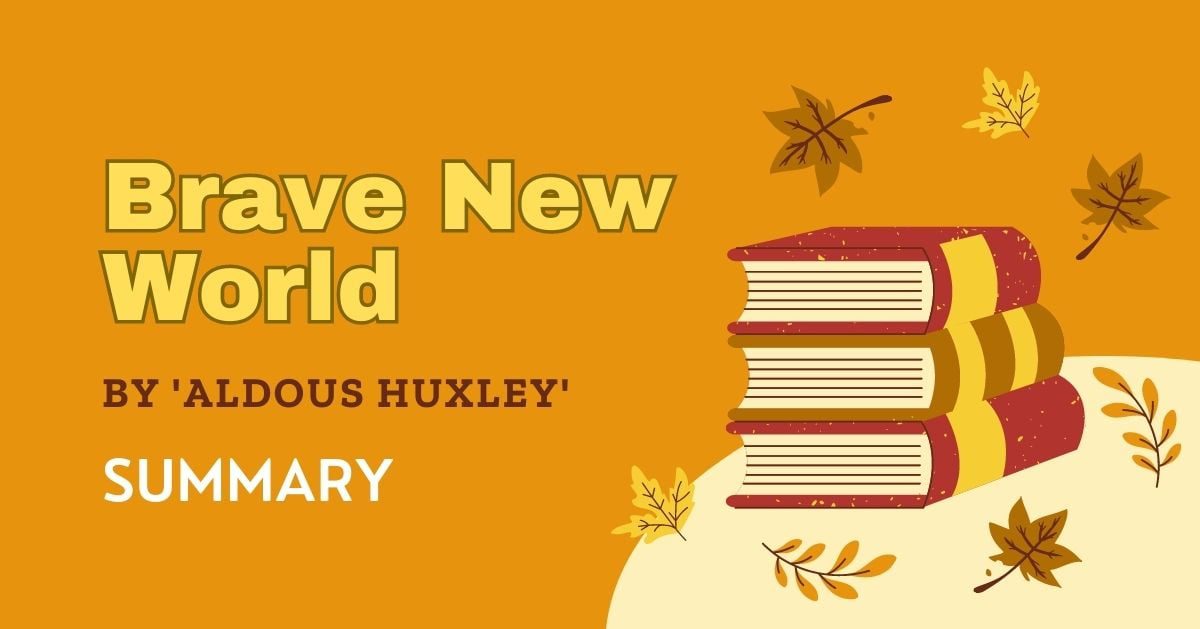Brave New World by Aldous Huxley: Summary

Aldous Huxley’s Brave New World, distributed in 1932, is a provocative novel that investigates a tragic culture set in the far off future. The clever presents an existence where logical headways and the quest for satisfaction have finished in a controlled, libertine society. Through an enrapturing story, Huxley digs into topics of singularity, the risks of uncontrolled mechanical advancement, and the dehumanizing impacts of an excessively designed society. This 1000-word synopsis will look at the vital components and basic parts of Brave New World, featuring its persevering through pertinence to current culture.
I. Setting and Society:
Exciting modern lifestyle happens in the year 2540 Promotion, where the world has been isolated into a few concentrated World States. In this new world request, residents’ lives are altogether administered by standards of steadiness, joy, and effectiveness. Huxley presents a general public that has killed conventional human issues like conflict, neediness, and illness. Be that as it may, this clear ideal world comes at the expense of uniqueness and real inclination.
II. The Brave New World’s Residents: Alphas, Betas, Gammas, Deltas, and Epsilons:
The general public in Brave New World is organized into a severe position framework, where people are hereditarily designed and molded from birth to fit explicit jobs. Alphas are the scholarly tip top, Betas are directors, Gammas and Deltas act as manual laborers, and Epsilons are the least station, intended to perform humble undertakings. This separation guarantees the productive working of society yet denies people of their opportunity and uniqueness.
[You can Also Read: The Hobbit by J.R.R. Tolkien: Summary]
III. Molding and Soma: Controlling the Majority:
One of the mainstays of soundness in the Brave New World is the Pavlovian molding of its residents. Through hypnopaedic rest instructing, the decision specialists ingrain convictions, values, and normal practices into the personalities of people since early on. Furthermore, the broad utilization of the medication “soma” keeps up with the populace’s personal harmony, advancing a feeling of fake satisfaction and smothering any sensations of discontent or disobedience.
IV. Bernard Marx and John “the Savage”:
The hero, Bernard Marx, is an Alpha who feels detached and disengaged from the general public he has a place with because of his actual contrasts. He is disparaging of the thoughtless congruity and shallow joys of his reality. On a visit to a “Savage Reservation,” Bernard experiences John, an outcast raised on the Booking, who turns into the impetus for scrutinizing the Exciting modern lifestyle’s qualities.
V. Conflict of Societies: The Savage’s Point of view:
First experience with the Brave New World acquaints pursuers with an elective lifestyle. His childhood in the Booking gives him an alternate point of view toward humankind, family, and connections, forcefully standing out from the genuinely clean world he experiences. John’s battle to accommodate his feelings with the general public’s standards turns into a focal subject of the novel, featuring the intrinsic pressure among independence and similarity.
[You can Also Read: The Harry Potter Series by J.K. Rowling: Summary]
VI. The Dehumanization of Sex and Connections:
In the Exciting modern lifestyle, sexual wantonness is supported, and the possibility of monogamous connections is viewed as crude. Love and responsibility are viewed as unfortunate, as they could upset the smooth working of the general public. Huxley utilizes this part of the novel to investigate the results of decreasing human communications to simple actual joy, absent any trace of profound associations.
VII. The Force of Information and Opportunity of Thought:
Huxley additionally stresses the meaning of information and writing. In this general public, show-stoppers and science have been controlled and supplanted with shallow, mind-desensitizing amusement. The concealment of information further supports the control the decision first class holds over the populace, making it provoking for people to address or oppose the laid out request.
VIII. Obstruction and Disobedience:
As Bernard and John become progressively frustrated with the Exciting modern lifestyle, they endeavor to challenge its standards. In any case, their endeavors at defiance are met with opposition, and the framework demonstrates versatile to any massive change. The novel investigates the trouble of testing profoundly instilled cultural designs, in any event, when confronted with reality with regards to their inborn imperfections.
[You can Also Read: The Lord of the Rings by J.R.R. Tolkien: Summary]
Conclusion:
Brave New World stays an immortal show-stopper that fills in as a wake up call about the expected risks of uncontrolled logical advancement, loss of distinction, and the concealment of human feelings. Huxley’s investigation of a tragic future fills in as a sign of the significance of protecting our mankind, opportunity of thought, and the need to fundamentally look at the course in which our general public is going. The clever’s subjects keep on resounding with contemporary perusers, asking them to ponder the possible results of focusing on accommodation and delight over evident human association and uniqueness.
